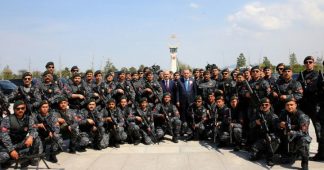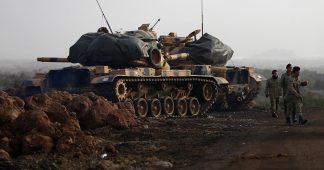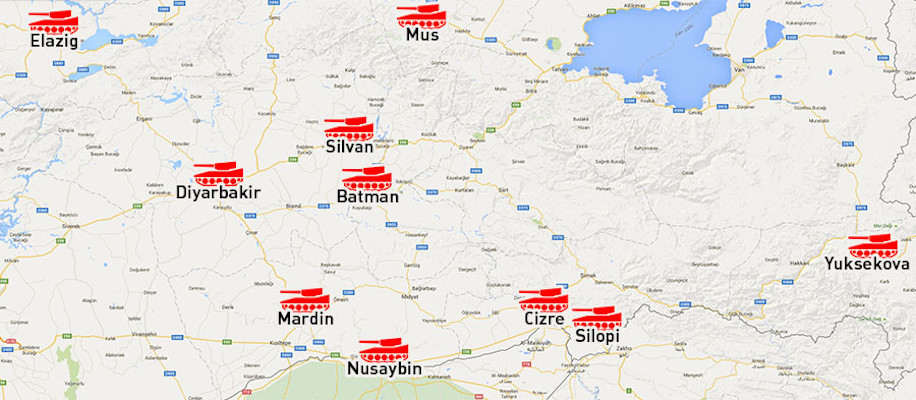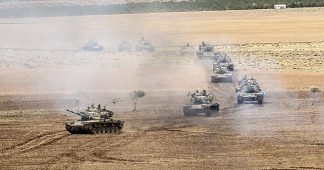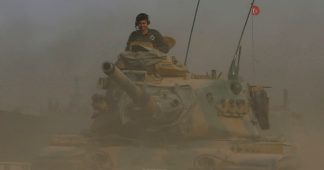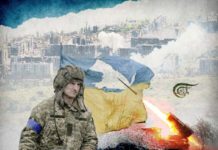June 17, 2018
Erdogan calls on “friends” for waging attack on Qandil
Turkish President Recep Tayyip Erdogan is banking on Iran’s support for a Turkish offensive against Kurdistan Workers Party (PKK) bases in the Qandil Mountain range bordering Iran and Iraq, although questions remain about the scope of the operation and the extent of Iranian backing.
Erdogan said that he has discussed the offensive with Iranian President Hassan Rouhani, and that they agreed on the need to maintain regional security. Turkish Defense Minister Nurettin Canikli said Turkey had offered to carry out the operation jointly with Iran.
The Turkish offensive against the PKK in Iraqi Kurdistan, the third in the past two years, appears linked to both Turkish elections June 24 and the formation of the next Iraqi government. Erdogan said June 15, “We have eliminated the terror corridor in northern Syria. Now we are bombing Qandil. We say to those who claim to be our friend: If you are our friend, take care of it. If you don’t do it, we’ll do it. We will have some other good news for you in a few days.”
“Iran has yet to respond to Turkey’s assertions that it is on board,” writes Amberin Zaman. “The country has a large and restive Kurdish population of its own and the PKK’s Iranian franchise, PJAK [Party for a Free Life in Kurdistan], has been growing in popularity, particularly among Shiite Kurds. Much like Ankara, Tehran is spooked by the United States’ support for the PKK-friendly Syrian Kurdish People’s Protections Units (YPG), which has drawn Iranian Kurds to its ranks.”
“A Turkish military operation against the PKK in Iraqi Kurdistan was already underway with Turkish troops deployed roughly 30 kilometers (nearly 20 miles) in the Harkurk region that falls northeast of Qandil,” adds Zaman. “But ‘the big one’ — a full-scale assault presumably involving ground forces taking on the mountain bases proper — has yet to begin. There is widespread skepticism that conventional methods could work against the guerrillas, who have a wide network of hideouts buried in the bowels of the craggy mountain chain, prompting speculation that Turkey’s bellicosity is more about vote-grabbing in the run-up to the June 24 polls. Many of their camps are mobile. And Qandil town, which is de facto administered by the PKK — a giant portrait of the imprisoned PKK leader Abdullah Ocalan stares from a mountain face at its entrance — is populated with hundreds of civilians.”
Metin Gurcan writes, “Turkey needs Tehran’s full military support for opening another advancement corridor from the east and northeast to reach Qandil. It also needs Baghdad and Erbil to provide active military support in the south. Without that help, Turkey is looking at a large-scale (maybe more than 30,000 soldiers) joint operation (Turkey-Iran-Iraq) designed as siege warfare and lasting at least a year. Otherwise, Ankara won’t be able to get effective results.”
Gurcan also reports, “It now seems that Tehran has been concentrating more on the activity of the Party for a Free Life in Kurdistan (PJAK), the PKK affiliate in Iran, and has limited its cooperation with Ankara against cross-border smuggling, and on border security and intelligence sharing about PJAK. Unlike Ankara, Tehran seems to have no strategic culture or ability to fight the PKK outside Iran’s borders, particularly in Iraq. One should also remember that Tehran has announced several times that it has no intention of supporting Ankara’s operation against the PKK in northern Iraq, at least for now. Tehran’s support for this operation seems highly unlikely, despite optimistic pronouncements by some Turkish officials.”
“Washington’s stance has a direct impact on the operation evolution because the United States currently controls northern Iraq’s airspace,” Gurcan says. “Ankara is drastically increasing its aerial activities in northern Iraq, which requires US consent and direct operational coordination, and more strategic and diplomatic synchronization.”
Turkey: staying or going in Syria?
“Turkey plans to open its fourth university in the northern Syrian territory it controls,” writes Fehim Tastekin. “It is just one of many steps that have people wondering if Ankara ever plans to leave the area.”
“Before establishing Harran University, the Turkish government, either singularly or by funneling assistance through civil society organizations, had already opened three universities in Syria. … [In addition,] Turkey is quietly assigning administrative officers to areas taken over in the Euphrates Shield campaign and Operation Olive Branch (launched in January). Ahmet Turgay, deputy governor of Gaziantep, is now working out of an office in Jarablus. In the area between Jarablus and al-Bab, Turkey’s Office of Religious Affairs and entities attached to the Ministries of Interior, Education, Health and Communications are indeed creating a parallel structure. Turkey’s Education Ministry has organized schools in Jarablus, Cobanbey, al-Bab and Azaz where about 200,000 students are being educated. Recently, these students received their report cards, which were adorned with Turkish and FSA flags, in ceremonies attended by Turkish officials,” Tastekin reports.
“Turkish police in 2016 and 2017 trained 5,000 Syrians for a parallel police organization, and Turkey’s postal service opened branches in Jarablus, al-Bab and Cobanbey. Selahattin Yildirim, attached to Turkey’s Office of Religious Affairs, was appointed mufti of al-Bab. Ankara is also moving ahead with activities to set up an industrial zone and a power station near al-Bab,” Tastekin writes.
Hariri calls on Putin to discuss Syria, refugees, Iran
Lebanese Prime Minister Saad Hariri, in Moscow for the FIFA World Cup, spoke with Russian President Vladimir Putin about Syria, including steps to address the Syrian refugee crisis.
“The Lebanese authorities have a strong interest in thousands of displaced Syrians returning home wherever security is restored,” writes Anton Mardasov. “Not only do the makeshift refugee camps undermine the already crippled Lebanese economy, but there have been reports of them serving as a breeding ground for recruitment by various terrorist groups. For both Moscow and Beirut, the issue has not only humanitarian and economic facets, but also a strong political element. The process of repatriating refugees requires the involvement of the Syrian regime, which has been internationally isolated. Hariri, however, doesn’t seem enthusiastic about dealing with Assad, especially in light of the American and Saudi positions on the issue. Hence, Russia’s role in this matter may be key.”
Joe Macaron writes, “Lebanese officials were troubled that UNHCR representatives stood near the buses in the Shebaa Farms area on the day of the scheduled return in a last-ditch attempt to persuade the displaced Syrians not to make this move. In a public statement the UNHCR said it was not involved in the relocation process ‘considering the prevailing humanitarian and security situation in Syria.’ The Lebanese authorities fear the international community is preparing Lebanon for an eventual long-term settlement of these refugees. In return, international actors believe the authorities are rushing the return process without having the necessary guarantees. The main contrast between both sides is a matter of assessment, whether the Syrian war is largely over or not.”
Macaron continues, “The return process at this point requires Syrian refugees to inform the Lebanese General Security of their intentions to go back to their home country. The authorities then process their request and clear their names with the Syrian regime. In recent months, the UNHCR representatives have begun to meet those willing to return to make sure their decision is voluntary. In the next step, the Syrian regime provides buses to transport the refugees who are returning to their home country. There are thousands of pending requests waiting to be processed and the Lebanese authorities expect this trend to continue. However, the challenge from a logistical perspective is the inability of the resource-stretched Syrian regime to process these requests and to secure enough buses.”
Mardasov says, “An additional irritant in the situation is Syria’s draconian new Law 10, which gives property owners one year to prove ownership or face seizure from the government. While the law has yet to be applied, presenting evidence of property ownership for refugees, including family members of the Syrian opposition, could be difficult and the law may thus impede their return. Hariri mentioned that this law had also been discussed with Putin.”
Mardasov adds, “The issue of the return of refugees and their property is closely associated with a second aspect of the Hariri visit: curbing Iranian influence. With the US withdrawal from the Iranian nuclear deal and Israeli pressure, Iran is seeking to make its presence in Syria less prominent. It will thus most likely rely on Hezbollah and other local militias to use their influence that has emerged as a result of demographic changes alleged by Syrian opposition sources, including the settlement of Shiites on the border with Lebanon and their purchases of property in a number of Syrian provinces. In turn, having acted as a defender of civilians in Arsal against the radical Syrian opposition, Hezbollah apparently improved its image among Lebanon’s Sunnis and more importantly secured a foothold that enables it to influence the course of war in Syria.”
